Event reports
The numbers are alarming: according to the Internal Displacement Monitoring Centre (iDMC), since 2009, an estimated one person every second has been displaced by a disaster, with an average of 22.5 million people displaced by climate- or weather-related events since 2008.
Taking these challenges into account, the Regional Programme Energy Security and Climate Change in Latin America of the Konrad Adenauer Foundation (EKLA-KAS) collaborated with the International Law Center (CEDIN) for the organization of the XIII Winter Course on International Law, specifically the realization of a course on Contemporary Challenges for the International Protection of Refugees: Institutional and Procedural Issues in the Interface between Human Rights and Environmental Law.
The course on Refugee Law and Environmental Protection took place between July 10-14 in Belo Horizonte, Brazil, with the participation of Professor Cecilia Marcela Bailliet of the University of Oslo (Norway).
The course provided students with a holistic approach to the legal and institutional framework for refugee, ranging from gender issues to terrorism. The active participation of the public was encouraged through an assignment to discuss the possible design of a new mechanism to address environmentally displaced persons and/or climate change migrants. Based on the Nansen Initiative Protection Agenda, the participants had to address the scope of protection and to identify the responsible actors. The students had to propose oversight and enforcement mechanisms as well as to debate if this instrument should be soft law or hard law, bilateral, multilateral, regional or universal.
Among the Nansen principles, it was highlighted that the responses to climate and environmentally-related displacement need to be informed by adequate knowledge and guided by the fundamental principles of humanity, human dignity, human rights and international cooperation. Although states have a primary duty to protect their populations and give particular attention to the special needs of the people most vulnerable to and most affected by climate change and other environmental hazards,
the leadership and engagement of local governments and communities, civil society, and the private sector are needed to address effectively the challenges posed by climate change.
It deserves special attention the difficulties to isolate climate change from other factors as the main cause of movement, and to define legal scope of a new treaty. Therefore, the course dealt with the necessary dialogue between existing instruments. In this sense, for example, the UN Refugee Agency (UNHCR) has provided technical support to The United Nations Framework Convention on Climate Change (UNFCCC) process and is committed to continue providing technical support to Parties in implementing the Paris Agreement.




